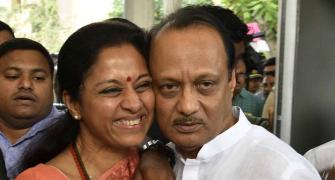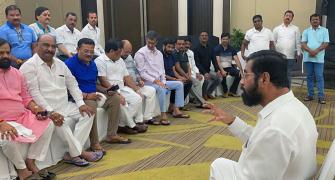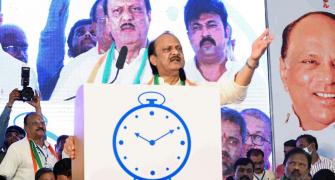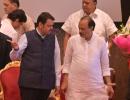While arithmetic political stability is a reality, the end result of politics in Maharashtra is hard to predict.

Many in Maharashtra believe that Sharad Pawar has gotten his just deserts.
Among them is Shalini 'Shalinitai' Patil (91), the widow of former Maharashtra chief minister Vasantdada Patil.
Her grouse against Pawar, now leader of a faction of the Nationalist Congress Party, the party he founded, dates back to 1978.
In the assembly polls held in February 1978, no party got a majority, and two factions of the Congress -- one led by Vasantdada Patil (69 seats) and another by the Congress-I (65 seats) -- came together to form a government.
As the government flailed amid daily bickering, Pawar walked out with 38 Congress MLAs to form a new government called the Samanantar Congress (Parallel Congress), becoming the youngest CM of the state at the age of 38.
When told of Pawar's 'coup' and his meeting with then governor Sadiq Ali, Patil wouldn't believe his interlocutors.
'But he just met me,' he kept saying.
Pawar's justification for his defection was Patil's increasing centralisation and unilateralism.
This is exactly what his erstwhile lieutenants say about Pawar today.
That government lasted two years. But it made Pawar CM for the first time. Between then and now, there have been multiple betrayals.
But this time, Pawar is on the receiving end, and this is a setback from which it will be hard for him to recover, say political pundits.
"Pawar's attempts to foist his daughter Supriya Sule upon the party are the price he has had to pay for the exit of his closest lieutenants," says a senior politician from the state.
"The loss of leaders like Chhagan Bhujbal and Praful Patel is a big blow. Without a doubt, it has weakened the NCP.
"It is just a matter of time for Ajit Pawar to merge the NCP into the Bharatiya Janata Party. Then, as a party, NCP will be finished," he adds.
Former Congress CM Prithviraj Chavan explains: "Ajit may have succeeded in breaking the NCP and securing a government position for himself and his supporters. But although the government is stable, even if the Eknath Shinde group moves out, Maharashtra, as a state, faces multiple challenges. This story is not over yet."
Chavan says the BJP is the party facing the biggest challenge.
"For it, it is a crisis of credibility and morality. Why isn't the RSS (Rashtriya Swayamsevak Sangh) saying anything about the BJP's participation in a government that has members with multiple cases of corruption against them?" he asks.
Local leaders enumerate the practical challenges before the government.
Tensions within the Eknath Shinde-Devendra Fadnavis-led government were already there and will likely be exacerbated now.
One manifestation was the advertisements that came up all over Maharashtra in June.
'According to the election surveys, 30.2 per cent of citizens of the state prefer the BJP, while 16.2 per cent prefer the Shiv Sena led by Shinde.
'This shows 46.4 per cent of people trust the ruling alliance for the development of the state, the adverts had said, causing griping between the MLAs of the two groups, with state BJP President Chandrashekhar Bawankule adding to the friction by declaring '2024 (elections) will decide who is more popular'.
The BJP is moving fast, announcing coordinators for parliamentary constituencies earlier this month and deepening the unease of the Shinde Shiv Sena.
The consensus among analysts is that, against the background of recent developments, the person to have drawn the shortest straw is former CM Fadnavis, who has had to accept a deputy chief ministership and, with Ajit's entry, now faces yet another rival for the top job in the state.
Chavan denies that it is the Congress that stands to lose the most from recent developments. He says the Maha Vikas Aghadi, of which the Congress is a member, would have won many more seats if the alliance had stayed intact.
But this much is true: Ajit's move and the NCP's 'dubious' secular credentials will leave minority communities searching for a viable political alternative. The Congress could emerge as one.
In caste terms, Maharashtra's strongest and politically most vocal caste, the Marathas, is seeing a fracture.
Marathas support the BJP, NCP, and Congress as well.
But analysts predict the biggest strain will be faced by the second-biggest and most powerful rural political lobby, the cooperatives, which will now be under pressure to contribute more to multiple points of power.
So, while arithmetic political stability is a reality, politics in Maharashtra is likely to see a silent upheaval. And the end result is hard to predict.
Feature Presentation: Aslam Hunani/Rediff.com










